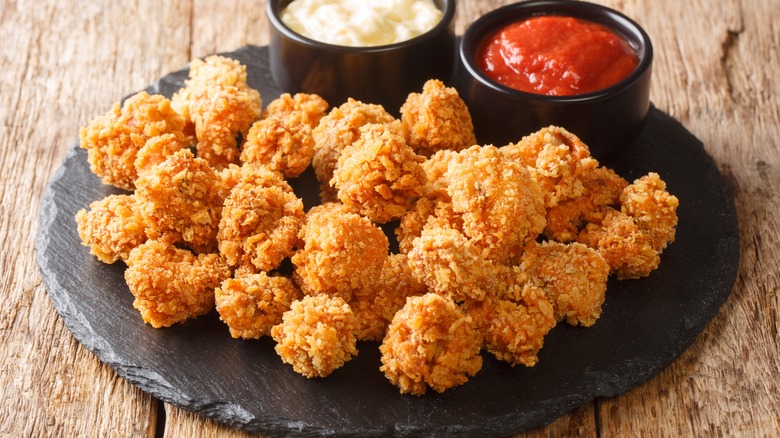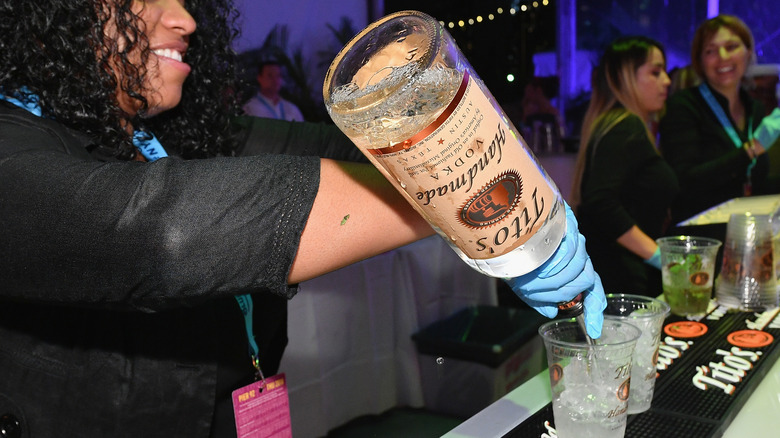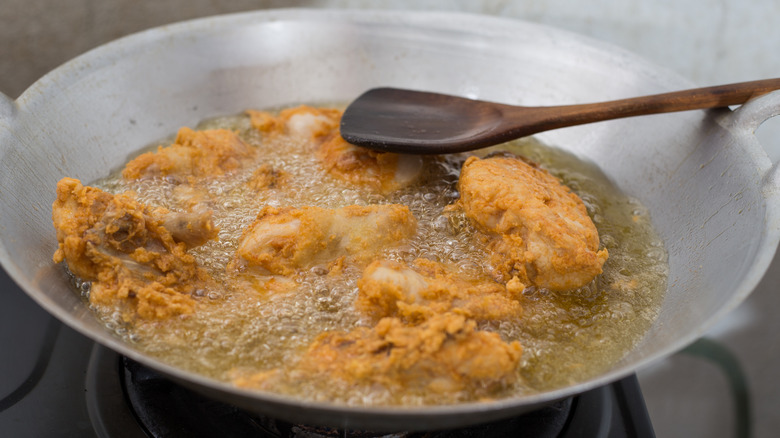How Vodka Can Actually Help Get The Crispiest Fried Chicken
Fried chicken is one of the most common meals eaten worldwide. Even the process for exceptional fried chicken is fairly straightforward: Wet the dry, dry the wet, and repeat. First, put the chicken in a marinade (wet the dry), then rinse and pat down the chicken (dry the wet). For breading, dunk the chicken in a batter (wet the dry) and dredge through flour and spices (dry the wet). Once you get to frying, you put the battered and dredged chicken in hot oil, then take it out and let the excess oil and moisture drain off. You could even take it a step further and toss the chicken in a sauce, and finish it off with a quick roast to thicken the sauce into a glaze.
Objectively, fried chicken can feel like a mundane meal, but cooks and cultures throughout history have made an effort to enhance and elevate this comfort food with unique spices, sauces, and seasoning methods. Some cooks experiment with brines and batter in an attempt to get the crispiest fried chicken possible. But adding one simple ingredient can drastically improve the crispiness and quality of your fried chicken.
Give it a shot
The trick to getting the crispiest fried chicken is to get the bird a little drunk first with a vodka marinade. Using vodka in a marinade or brine well before cooking gives it time to thoroughly soak into the chicken, which is necessary for it to work its magic once it's time to fry.
Fried foods achieve crispiness when hot fry oil (usually 350 to 375 degrees F) causes food's retained water to rapidly evaporate, cooking the food from the inside while the starchy breading begins to form a golden brown crust in a phenomenon called the Maillard reaction (via MasterClass). As the water cooks out, it steams and expands, creating bubbles in the food. J. Kenji López-Alt explained to Insider: "Alcohol is more volatile than water, so it evaporates more rapidly and violently than the water in a typical marinade ingredient, like buttermilk." Ethanol's forceful vaporization creates larger bubbles in the fried chicken, effectively increasing its surface area.
A better batter
Another way vodka can enhance fried chicken's crispiness is in the batter itself. One of the unique qualities of alcohol is that it has a tendency to denature proteins like gluten. Modernist Cuisine tells us that gluten forms when water (or water-based liquid) is mixed into the flour, which rehydrates proteins that almost immediately begin linking and binding, causing the batter to become more elastic and doughy. As the dough is worked, the gluten bonds get stronger, which can result in a chewier end product, but vodka does not contribute to this process, acting as a sort-of substitute liquid that does not affect your batter (via Scientific American). Introducing vodka to your fry batter reduces the strength of the gluten bonds, keeping the batter thin for extended use and the crust more flakey and crispy rather than tough and chewy.
Additionally, these batters benefit from vodka's quick evaporation because the batter itself is more effectively dehydrated, creating a crispier crust (via Insider). Vodka's high volatility means it leaves less moisture behind, unlike water which may continue to steam off post-cook, potentially causing the fried chicken to become soggy, the enemy of crisp. The addition of vodka in fried chicken, both early during the marinating process and later while dredging, effectively enhances the overall crispiness through ethanol's physical reaction to heat as well as its chemical reactions with gluten.


